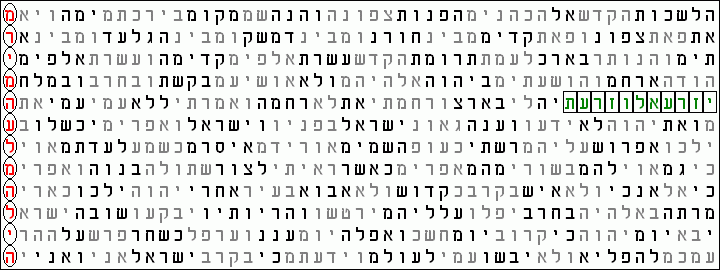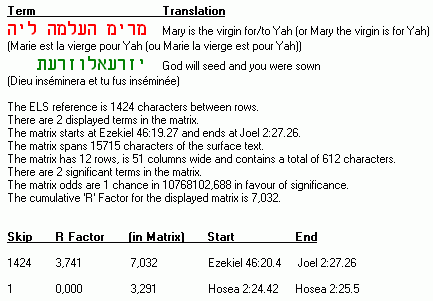
Code by Fab
Mary is the virgin for Yah.


Inspired by a recent discussion on the "Virgin Birth" of Jesus, I decided to take a second look in the codes to clear up something. By the way, I don't think believing or not in the Virgin Birth will lead anyone to the Lake of Fire personally :-), but since it is so plainly asserted in the gospels of Matthew and Luke (for which there is strong scientific evidence of divine inspiration: http://www.biblecodedigest.com/page.php/363), and Matthew (1:18-23) even took the trouble to quote Isaiah 7:14 and specified clearly (verse 22) it was in fulfillment of this prophecy, I think what is at stake here is the credibility and inspiration of the NT itself then (2 Timothy 3:16, 2 Peter 3:16). I already found an interesting long code in the Tanach (OT) a while back using the expression "Mary is the virgin": http://exodus2006.com/Fab2/Mary1.htm But since it was found in the Tanach using CodeFinder, and the versions of the Tanach are not exactly the same in all the programs (like The Keys to the Bible for instance - This code cannot be found with The Keys), and according to both the Torah and seasoned researchers like Moshe Shak, only one code is not enough to establish a matter:
http://www.biblecodedigest.com/page.php/252
Deuteronomy 19:15: "One witness shall not rise up against a man for any iniquity, or for any sin, in any sin that he sinneth: at the mouth of two witnesses, or at the mouth of three witnesses, shall the matter be established." I decided to rerun the same search and to retain the shortest skip only this time. The new code could be found in all the versions I checked so far. It was extendable to "Mary is the virgin to/for Yah" (I used the Hebrew word העלמה (see below for the definition) since it is the one used in Isaiah 7:14): http://cf.blueletterbible.org/lang/lexicon/lexicon.cfm?Strongs=H05959&t=KJV
Strong's Hebrew Lexicon:
from 05958; n f; {See TWOT on 1630 @@ "1630b"}
AV-virgin 4, maid 2, damsels 1; 7
1) virgin, young woman
1a) of marriageable age
1b) maid or newly married
There is no instance where it can be proved that this word designates a young woman who is not a virgin. (TWOT)
Interestingly, I noticed in one of the verses (Hosea 2:22 or 24 depending on the version one uses) crossed by the code the same Hebrew term יזרעאל (meaning "God will seed/sow" or "God sows" or "that which God planted": http://cf.blueletterbible.org/lang/lexicon/lexicon.cfm?Strongs=H03157&t=kjv) already found in the previous code, hard to believe it's just a coincidence indeed.
The Jewish rabbis who wrote the Septuagint already used the Greek word "Parthenos" meaning "virgin", the same word was also used in Matthew 1:23.
For a particularly thorough discussion on the meaning of "almah" (a bit lengthy but interesting):
http://www.wlsessays.net/authors/B/BeckAlmah/BeckAlmah.PDF
See also: http://exodus2006.com/Fab2/Mary2.htm
Fab